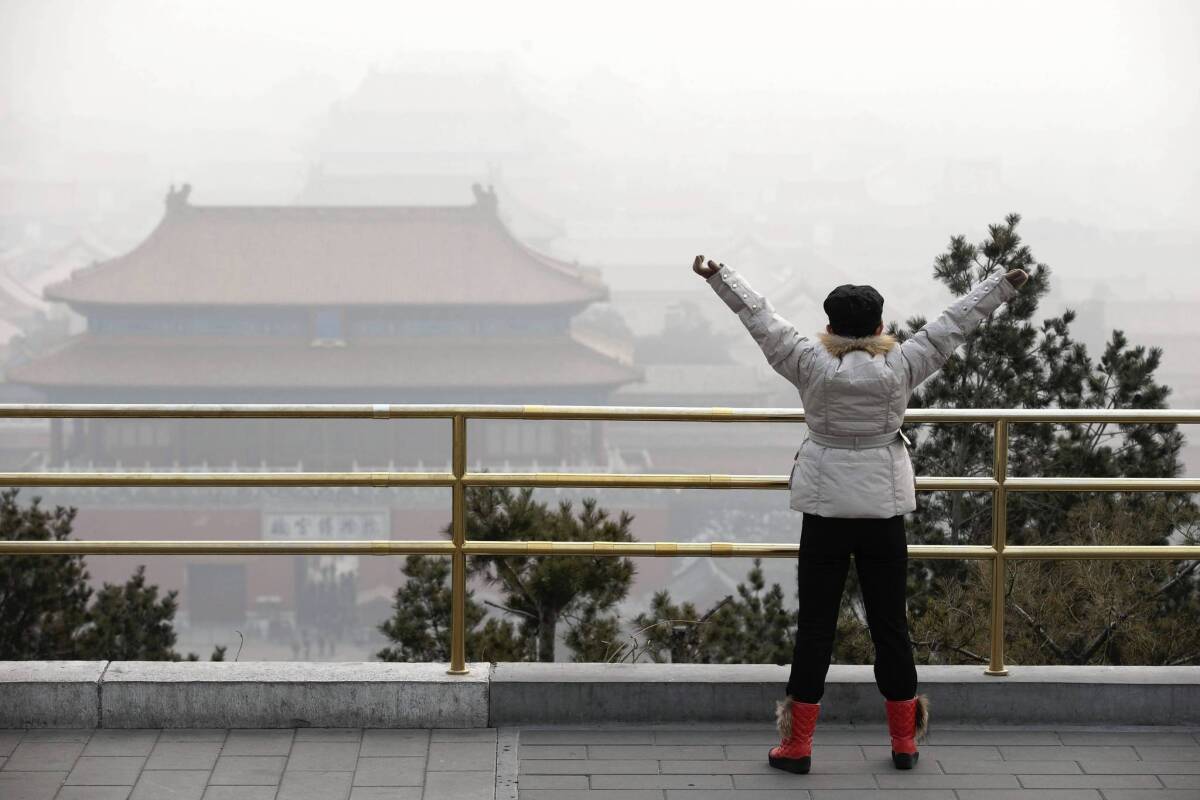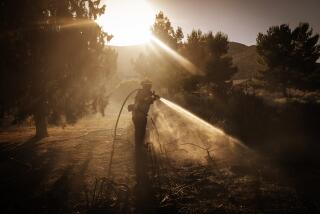China hit by extreme air pollution

BEIJING â A large swath of China has been gripped for days by what is being called an âairpocalyse,â a prolonged spell of the worst air pollution on record in Beijing.
From Beijing to Guiyang, 1,100 miles to the southwest, a thick soup of pollution closed highways, forced the cancellations of flights and sporting activities, and sent countless people to hospitals complaining of respiratory ailments.
The government has repeatedly issued an alert urging people in the affected areas to âavoid outdoor activities and, if they do have to go out, to wear a protective mask.â
In Beijing, education authorities ordered schools to cancel gym classes.
As an emergency measure, the Beijing Bureau of Environmental Protection announced Sunday that factories and construction sites had agreed to reduce or stop work until the air clears up.
The U.S. Embassy in Beijing on Saturday night recorded fine particulate matter at 886 micrograms per cubic meter, the highest since monitoring began in 2007. That makes for an air quality index ranking of 755, far off the charts, which rate 300 to 500 as âhazardous.â Although in the past the Chinese government has accused the embassy of scaremongering, its own monitors over the weekend gave readings that were also dire, showing pollution as hazardous in 33 cities.
âThe air pollution is unprecedented. This is the first time in Chinaâs history we have seen it this bad,â said Zhao Zhangyuan of the Chinese Research Academy of Environmental Sciences.
Although the numbers were lower Sunday, air quality was still at hazardous levels for more than 100 million Chinese, according to U.S. and Chinese monitors.
The episode highlighted Chinaâs vulnerability, demonstrating how pollution could slam the brakes on the upward trajectory of its economic growth.
âThis is very dangerous,â said Dai Qing, a veteran democracy activist from Beijing who now works on environmental issues. âIf there is social unrest in China, it will happen not because of the gap between rich and poor, not because of corruption, but because of the environment.â
The air pollution could also turn into a political crisis for the Communist Party, which sees rapid economic growth as key to its enduring legitimacy.
âReturn the blue skies and white clouds to me. If economic growth comes at a price of such pollution, I would rather go back to the 1980s,â wrote one microblogger.
Zhao said environmental protection authorities in the last few years had lost many of their better experts â some quit in despair and others were fired â and had been hiring people apt to rubber-stamp approval for factories and other developments without enough consideration.
âThis crisis is entirely predictable because the government didnât do its duty. I just didnât expect it would happen so quickly,â Zhao said.
Beijingâs opaque air has been described variously by writers as resembling cotton candy, pea soup, the atmosphere downwind from a forest fire or the smokersâ lounge at an airport. Bloggers have simply tagged it as the âairpocalyse.â
After weeks of record-breaking cold, accompanied by clear, dry skies, the weather turned warmer late Thursday. By the weekend, many of the pedestrians in Beijing were wearing face masks. On Saturday, the Childrenâs Hospital of Beijing reported 900 children treated for respiratory problems. Hospitals also reported sharp increases in the number of older patients who were having difficulty breathing.
In preparation for the 2008 Summer Olympics, Beijing authorities invested an estimated $10 billion in cleaning up the environment. As part of the plan, they moved out huge steelworks, switched residents from coal to natural gas heating and raised emission standards. Restrictions on new car registrations have been in place since 2010.
Environmental scientists say, however, that factories outside the municipal boundaries still contribute to the pollution in Beijing. The unusual cold this winter throughout China has also led to an increase in coal burning outside the city.
In the past, the government said murky air was merely a weather problem. Scientists, however, said the underlying problem is pollution, with fog and a lack of wind causing it to be trapped in a basin formed by the mountains north and west of Beijing.
Although the air quality in Beijing has worsened, reporting and awareness have improved dramatically in recent years. Beginning Jan. 1, nearly 75 cities began releasing real-time data on concentration of fine particulate matter, considered the most dangerous pollutant for the lungs.
âOn days like this our son doesnât go outside and if he does itâs with a mask on,â said Qian Juwei, a 30-year-old professional in Beijing. He and his wife have an air filter in their home.
âMy son tells me I should move out of Beijing to Hong Kong,â said Chen Derong, a businesswoman in her 60s who has lived most of her life in Beijing. âA friend called me today and said that maybe the whole government will have to relocate from Beijing because of the pollution.â
Beijingâs emergency measures announced Sunday call for 54 factories to reduce emissions by 30% and 28 construction sites to suspend work. A Hyundai automobile plant has promised to halt production for a day, according to the website of the Beijing Bureau of Environmental Protection.
Meteorologists said the pollution will most probably linger until Tuesday, when the wind picks up.
Pollution made the front pages of many papers over the weekend.
âWhatâs going on with our air?â read a large headline in Sundayâs editions of Peopleâs Daily, the newspaper closest to the Chinese Communist Party.
Tommy Yang and John Hannon of The Timesâ Beijing bureau contributed to this report.
More to Read
Sign up for Essential California
The most important California stories and recommendations in your inbox every morning.
You may occasionally receive promotional content from the Los Angeles Times.










